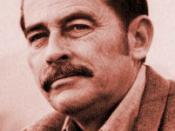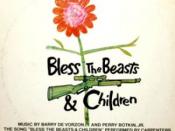My investigation examined the theme of individuality vs. conformity. The texts I have chosen gave an effective portrayal of this. The texts I selected included 'One Flew over the Cuckoo's Nest' by Ken Kesey, 'Bless the Beasts and Children' by Glendon Swarthout, 'Fahrenheit 451'by Ray Bradbury and 'Brave New World' a novel by Aldous Huxley. Each of these texts expressed the theme of individuality vs. conformity in a different way depending on the setting and the main character, but for each character the consequences of asserting his individuality was tragic.
How did the social setting demand conformity from the characters and why does the main character not conform?
In 'One Flew over the Cuckoo's Nest' the setting was a psychiatric hospital which reflected society and the order that was forced on the patients reflected the pressures of modern American society. The authority -represented by "Big Nurse"- demanded conformity by humiliating the patients and exploiting their weaknesses.
Mc Murphy, the main character in the novel did not conform at first because he hoped to exploit the patients and make some money, and later because he felt compassion for the other inmates. He challenged Nurse Ratched's authority which showed the other inmates that she was not all-powerful and helped them become more assertive.
In 'Bless the Beasts and Children' the setting was a Boy's Summer Camp which demanded conformity by enforcing competition and humiliating the losers. The Bedwetters could not conform because they were emotionally disturbed, being neglected by their parents. John Cotton the leader challenged the authority by leading them on a quest to free the buffalos. He was motivated by compassion for the disturbed children and the buffalo. Both these novels offered a criticism of modern American society and how it represses individuality and differences.
Both 'Fahrenheit 451' and 'Brave New World' were dystopias (an unpleasant society set in the future). The future setting of 'Fahrenheit 451' demanded conformity by making firemen burn books and punishing those who read them. People drove in fast cars, watched TV and listened to the radio. Books were banned because reading led to thinking, arguing, conflict and social instability. The protagonist was Guy Montag who was a fireman. He rebelled against his job and society because he decided that it was wrong to burn books and the people who read them. He thought that it was important for people to think, discuss and gain knowledge.
The futuristic setting and environment of restriction was also illustrated to in 'Brave New World', where society was divided into certain groups with different intelligences. This society had been structured to maximize and create social stability where no one could question authority or not conform. Belonging to a certain group made everyone feel pleased in their jobs and lives, people who felt depressed were made to take Soma, a drug. Everybody was kept happy so no one was discontented or critical. There are two characters that did not conform in the novel 'Brave New World'. One was Bernard Marx a superior 'Alpha'. He didn't look like other Alpha's. This gave him an inferiority complex. He felt critical about himself and critical about everything around him. He stirred up trouble because he used John Savage to get attention and become popular.
The other character was John Savage from the reservation. He expressed his individuality because of his upbringing. In the reservation he learnt ideas and values that were opposed to the ideas and values of the main society. It was impossible for him to understand or adjust to the Brave New World. In a world where no one was allowed to be unhappy John Savage said "I'm claiming the right to be unhappy."
What did the main character do to assert his individuality which led to tragic outcome?
At the end of the novel 'One Flew over the Cuckoo's Nest' Mc Murphy was dead. He offered a series of challenges to Nurse Ratched's power for example he took the group on a fishing trip in spite of everything she did to prevent it. His achievement was that his self assertion showed the other patients how they could assert themselves and establish their own identity. In the end he attacked 'Big Nurse' physically and she punished him by a series shock treatments and finally lobotomy. He was no longer able to maintain himself anymore, Chief Bromden killed him mercifully but he died because he asserted his individuality in order to help the group so he sacrificed his life for others. John Cotton was another character who asserted his individuality to help his group of sad little boys assert themselves. At the end "They were not sucking thumbs or biting nails or grinding teeth"." 'I'm proud of us.' he said". John Cotton drove over a cliff and died, so he also sacrificed himself in order to divert attention of the law away from the Bedwetters actions.
Guy Montag expressed his individuality by searching for a solution for his meaningless life which he was influenced to do so by a mysterious girl called Clarisse. He collected and read books and learned how to find sense from the books that he had been burning. He was motivated by an unrealistic idealism, that he could change society and bring back a book reading culture. His dissatisfaction with the idea of burning a precious tool that gives sense to life, led to him losing everything he had. Although he was not destroyed he lost his wife, home, job and identity. He escaped across the river and joined a group of penniless intellectuals but faced a very uncertain future. The same idea of losing identity and sacrifice was evident in 'Brave New World', where an outsider was forced to conform but couldn't. Savage failed to comply because of his upbringing and punished himself for the outlook of life in 'Brave New World' that was influencing him against the values he was taught. His failure to conform meant humiliation and the feeling of not knowing who he was or how he could live. This led him to despair and he committed suicide.
In conclusion, it was seen that in these four novels the settings, characters and the motivation of these characters were different. In all the novels the outcome was similar because each main character was destroyed as a consequence of asserting his individuality and challenging authority to an intolerable degree. These novels invited us to consider to what extent our own New Zealand society represses and enforces conformity, by limiting people's critical judgment, diverting them with mass media and sports.


